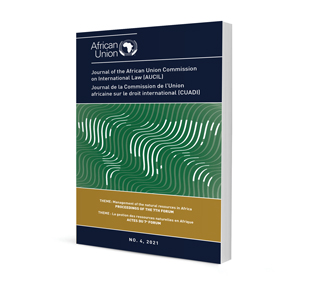Some current legal questions raised by the management of natural resources in Central Africa (States members and zone ECCAS) / Quelques questions juridiques actuelles soulevées par la gestion des ressources naturelles en Afrique centrale (États membres et espace CEMAC)

Some current legal questions raised by the management of natural resources in Central Africa (States members and zone ECCAS) / Quelques questions juridiques actuelles soulevées par la gestion des ressources naturelles en Afrique centrale (États membres et espace CEMAC)
Author: Par James Mouangue Kobila
ISSN: 1821-8962
Affiliations: Agrégé de Droit public; Vice-recteur chargé de la recherche, de la coopération et des relations avec le monde des entreprises à l’Université de Douala; Vice-président de la Commission des Droits de l’homme du Cameroun; Observateur au Secrétariat permanent du Programme des réformes économiques et financières de la CEMAC
Source: Journal of the African Union Commission on International Law 2021, p. 204-268
https://doi.org/10.47348/AUCIL/2021/a7
Abstract
Based on the case study of ECCAS’s member states, this study raises a series of problems which can be linked to the highly theoretical problematic of the relationship between international investment law and the regional law, two autonomous normative systems which pursue different objectives on the basis of international law standard that binds different parties. This study proposes short, medium and long term legal solutions which can be used by states to restore their sovereignty over their natural resources, in particular by indicating to them how to cancel the excessive tax expenditure granted to investors in establishment conventions and how to overcome stabilisation clauses inserted in these same state’s contracts. These measures are particularly useful in protecting states from possible legal consequences of measures taken in the context of the fight against the pandemic of the new corona virus. Finally, this study contains many proposals relating to the reform of investment law applicable to Africa, such as regionalism which would facilitate the generalisation of the right to regulate in the general interest.
À partir du cas des États membres de la CEMAC, cette étude soulève une série de problèmes que l›on peut rattacher à la problématique éminemment théorique des rapports de système entre le Droit international des investissements et le Droit communautaire, deux systèmes normatifs autonomes qui poursuivent des objectifs différents sur le fondement de normes internationales liant des parties distinctes. Elle permet d’offrir aux États des solutions juridiques utilisables à court, à moyen et à long terme pour restaurer leur souveraineté sur leurs ressources naturelles, notamment en leur indiquant comment revenir sur les dépenses fiscales excessives accordées aux investisseurs dans les conventions d’établissement et comment faire échec aux clauses de stabilisation insérées dans ces mêmes Contrats d’État. Ces mesures s’avèrent particulièrement utiles pour protéger les États des éventuelles conséquences juridiques des mesures prises dans le cadre de la lutte contre la pandémie du nouveau Corona virus. Cette étude renferme enfin de nombreuses propositions relatives à la réforme du Droit des investissements applicable en Afrique, parmi lesquelles celle du régionalisme qui faciliterait la généralisation du Droit de règlementer dans l’intérêt général.